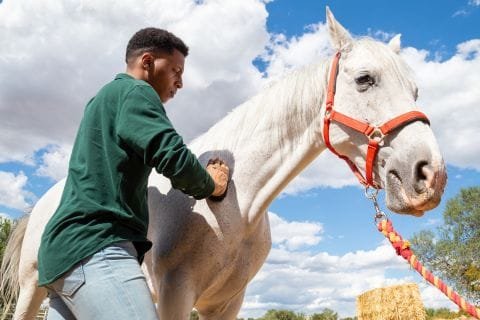Maintaining a healthy coat for your horse is essential not only for aesthetic purposes but also for the overall well-being of the animal.
A shiny, smooth coat is often an indication of good health, while a dull or rough coat can signal nutritional deficiencies, stress, or poor care. Here’s a comprehensive guide on how to maintain a healthy coat on your horse:
1. Provide a Balanced Diet
The foundation of a healthy coat starts with proper nutrition. A well-balanced diet ensures your horse receives the vitamins, minerals, and nutrients required for optimal coat condition.
- Essential Fatty Acids: Omega-3 and omega-6 fatty acids, found in supplements or certain feeds (like flaxseed or fish oil), promote a shiny, healthy coat by improving skin health and moisture.
- Vitamin A and E: These vitamins are essential for skin and coat health. Ensure your horse’s diet includes fresh forage, such as hay and pasture, rich in these vitamins.
- Biotin and Zinc: Biotin (vitamin B7) and zinc are crucial for hoof and coat health. Many commercial equine supplements contain these, so consult your vet for the right dosage.
2. Groom Regularly
Regular grooming not only keeps your horse looking great but also promotes blood circulation, removes dirt and debris, and distributes natural oils throughout the coat. Proper grooming helps:
- Brush your horse daily using a curry comb, stiff brush, and soft brush to remove dirt, sweat, and loose hair.
- Focus on key areas: Pay extra attention to areas where dirt can accumulate, such as the girth area, under the belly, and the mane and tail.
- Massage the skin with a curry comb, which stimulates hair follicles and promotes the growth of a healthy coat.
3. Keep Your Horse Hydrated
Water is vital for maintaining the condition of your horse’s coat and overall health. Dehydration can lead to dry, flaky skin and a dull coat. Ensure your horse always has access to fresh, clean water.
- Hydration helps the skin maintain elasticity and moisture, which contributes to a shiny coat.
4. Provide Shelter and Protection from the Elements
Harsh weather can affect your horse’s coat condition, especially in extreme cold, heat, or humidity.
- Winter Care: In colder months, horses often grow a thicker coat. Keep them dry and provide shelter from the wind and wet conditions. Be sure to brush the coat regularly to prevent it from becoming matted.
- Summer Care: During hot months, consider using fly sheets or UV-protective blankets to protect your horse’s coat from sun damage and insect irritation. These items can also prevent sunburn and keep the coat from becoming dry and brittle.
5. Use Coat-Enhancing Products
While good nutrition and grooming are essential, there are products that can enhance your horse’s coat.
- Coat conditioners and shine sprays: These can be used occasionally to help add shine and improve the coat’s appearance. Avoid using them too frequently, as they can clog pores and interfere with the natural oils of the skin.
- Oils and liniments: Some oils, such as coconut oil or linseed oil, can be applied sparingly to the coat to promote a shiny appearance, but these should be used with caution as they can cause irritation if overused.
6. Ensure Proper Health Care
A healthy horse is more likely to have a shiny coat. Regular veterinary care is essential in keeping your horse in top condition.
- Regular Deworming: Worm infestations can cause poor coat quality, as parasites deplete nutrients. Ensure your horse is on a regular deworming schedule as recommended by your vet.
- Flea and Tick Control: Pests like fleas, ticks, and lice can irritate the skin, causing hair loss or a dull coat. Use recommended pest control products and monitor for signs of infestation.
- Manage Stress: Stress can negatively impact your horse’s coat. Ensure your horse is in a calm environment with adequate social interaction and exercise.
7. Regularly Trim the Mane and Tail
Keeping your horse’s mane and tail neat and free from tangles helps maintain a healthy coat overall.
- Detangle the mane and tail: Regularly comb the mane and tail to prevent knots and tangles. This ensures the hair grows freely and stays healthy.
- Trim split ends: Regular trims help to keep the mane and tail looking neat and prevent damage from excessive breakage.
8. Sunlight Exposure
Sunlight is vital for horses, as it helps them synthesize Vitamin D, which supports healthy skin and coat. Ensure your horse has time to graze or spend time in the sun, particularly if it is kept indoors during the day.
- Moderate Sun Exposure: While too much direct sun exposure can lead to sunburn, a balanced amount of sunlight can aid in maintaining a healthy coat.




